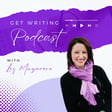
Episode 119: Creativity Isn’t the Goal, It’s the Way Back to You—with author Clementine Moss
For the past twenty years, I've been obsessed with trying spiritual tools—anything to help me balance my mind, boost my mindset, heal all those inner wounds and get and keep me focused.
Meditation apps, energy healing sessions, therapy modalities I can barely pronounce—if it promised to help me understand myself better or unlock some creative potential, I was all in.
But here's what I never expected: all of that inner work would become absolutely essential to my writing career.
When I started writing seriously, I hit wall after wall. The voice in my head was relentless: Who do you think you are? You're not a real writer. This is garbage. Sound familiar? I'd sit down to write and immediately get hijacked by that internal critic, or I'd pour myself into work projects instead—anything to avoid the vulnerability of putting my own words on the page.
It took me years to realize that my writing wasn't blocked by lack of talent or time—it was blocked by all the old stories I believed about myself. The meditation practices, the mindset work, the spiritual tools I'd been gathering? They weren't just nice-to-haves. They were the keys that unlocked everything.
That's why this conversation with Clementine Moss hit me so deeply. She's living proof that creativity and spirituality aren't separate paths—they're two sides of the same coin.
Clementine is a professional drummer who makes her living in a Led Zeppelin tribute band, but she's also a contemplative writer, meditation practitioner, and spiritual counselor. Her memoir From Bonham to Buddha and Back explores how drumming and meditation became parallel doorways to the same destination: healing those deep patterns of unworthiness that keep so many of us from fully stepping into our creative power.
In this conversation, Clementine shares:
• How she discovered that drumming and meditation were seeking the same healing—connection to that "invincible, infinite part" of herself
• Why creative people seem to carry such deep feelings of unworthiness (spoiler: she thinks it's universal, but artists feel it more acutely)
• Her journey from identifying as a writer to letting music take over for a decade—and how that "detour" gave her exactly the material she needed
• The synchronistic way she found her writing coach (hint: it involved a pug and a garden)
• How studying to become a spiritual counselor unexpectedly unleashed a flood of creative output
• Her unique healing practice called depth hypnosis, which combines shamanism, Buddhism, and Western psychology
• Why she believes you must follow your creative life force, even when it doesn't match your logical plans
What struck me most about Clementine's story is how she learned to trust the process—both in creativity and in healing. She talks about showing up to write or make music even when she felt like she had nothing, calling it "running the dirty tap" to clear the way for what wants to come through.
Her latest album Clem and Clear Light is literally a love letter to the parts of herself she had to release in order to grow. As someone who's also had to say goodbye to old versions of myself that weren't serving my creative path, I found this incredibly moving.
This isn't just a conversation about balancing different creative pursuits. It's about recognizing that all the work we do on ourselves—the meditation, the therapy, the spiritual seeking—isn't separate from our art. It IS our art. It's what gives us access to the authentic voice that's been waiting underneath all our conditioning and fear.
If you've ever felt torn between your practical responsibilities and your creative calling, or if you've wondered whether all that inner work you're doing actually matters for your art—please take the time to listen to t
